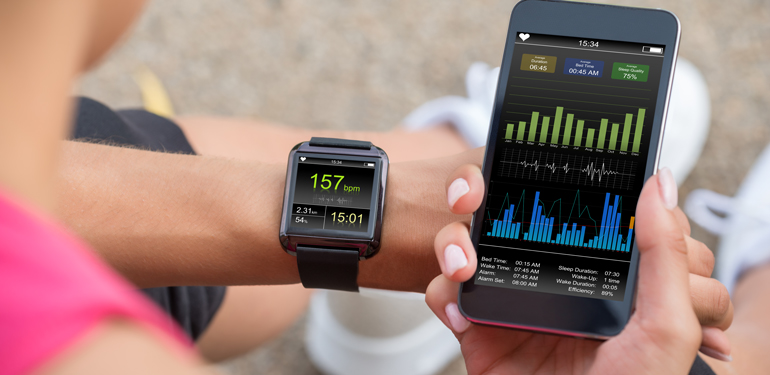Academics / Graduate Study / MS Programs / SpecializationsInternet-of-Things & Edge Computing
The Internet of Things (IoT) market is exploding, with one trillion connected devices predicted in the next decade that are producing enormous amounts of data. Countless sensor-based devices are continuously scanning the environment to collect and report data on their surroundings. As a result, the requirement to analyze data in near real-time has become vital across many industries, including wearables, manufacturing, energy, security, healthcare, agriculture, telecommunications, retail, and finance.
Edge computing is igniting a paradigm shift in IoT. where data is captured and processed close to the source. The results include minimizing latency, power, and data transit costs while producing real-time feedback and decision-making. With projections of more than 150 zettabytes of data generated annually, the advantages of edge computing platforms have never been more apparent. By allowing organizations to process more data and generate more complete insights, edge computing is quickly becoming standard technology for those heavily invested in IoT.
IoT and edge computing are significant areas in the field of cyber-physical systems (CPS), in which networking, computation, and physical components are seamlessly integrated together. In CPS, software and physical components are deeply intertwined and interact with each other in ways that change with context. CPS helps improve efficiency, performance, reliability, and security of business and technology infrastructure. The growing demand for state-of-the-art CPS infrastructure is driving the urgent need of new methodologies, algorithms, and tools for the modeling, simulation, synthesis, and verification of such systems.
In this track, you will be introduced to a broad foundation and deep domain knowledge in IoT, edge computing and CPS to take full advantage of this explosive growth opportunity. You will learn how to build intelligent ecosystems that will allow devices to collect and analyze data at scale, by focusing on four key areas of CPS: hardware, software, networks, and critical infrastructure.
Program details
Core Courses
Select at least six courses from the following list:
- ECE 303 Advanced Digital Design
- ECE 329 The Art of Multicore Concurrent Programming
- ECE 346 Microprocessor System Design
- ECE 355 ASIC and FPGA Design
- ECE 364, 464 Cyber-Physical Systems Design and Application
- ECE 365, 465 Internet-of-Things Sensors, Systems, and Applications
- ECE 366, 466 Embedded Systems
- ECE 387 Real-Time Digital Systems Design and Verifications with FPGAs
- ECE 395, 495 Modeling and Synthesis of Cyber-Physical Systems
- ECE 395, 495 Sustainable Internet of Things
- ECE 395, 495 Wearable and Physical Computing
- ECE 326 Electronic System Design I
- ECE 327 Electronic System Design II
- ECE 333 Introduction to Communications Networks
- ECE 359 Digital Signal Processing
- ECE 363 Digital Filtering
- ECE 375, 475 Machine Learning: Foundations, Applications, and Algorithms
- ECE 395, 495 Introduction to Wireless Networks
- ECE 395, 495 Personal Health Systems
- ECE 478 Advanced Digital Communications
- ECE 510 Topics in Wireless Communications and Networking
Elective Courses
Select up to six courses from the following list:
- BME 313 Wearable Electronics: From Sensing to Biomedical Inference
- BME 353 Bioelectronics
- ECE 347-1 Microprocessor Systems Project I
- ECE 347-2 Microprocessor Systems Project II
- ECE 361 Computer Architecture I
- ECE 362 Computer Architecture Project
- ECE 392 VLSI Systems Design Projects
- ECE 393, 493 Advanced Low Power Digital and Mixed-signal Integrated Circuit Design
- ECE 395, 495 Embedded Artificial Intelligence
- ECE 452 Advanced Computer Architecture I
- ECE 456 Modern Topics in Computer Architecture
- CS 307 Introduction to Cryptography
- CS 310 Scalable Software Architectures
- CS 312, 412 Data Privacy
- CS 338 Practicum in Intelligent Information Systems
- CS 339 Introduction to Database Systems
- CS 340 Introduction to Computer Networking
- CS 343 Operating Systems
- CS 345 Distributed Systems
- CS 350 Introduction to Computer Security
- CS 354 Computer System Security
- CS 355 Digital Forensics and Incident Response
- CS 396 Advanced Offense and Defense in Cybersecurity
- CS 396 Foundations of Security
- CS 396, 496 Advanced Topics in Cryptography
- CS 397, 497 Selected Topics in Computer Networks
- CS 397, 497 Wireless and Mobile Health (mHealth)
- CS 397, 497 Wireless Protocols for the Internet of Things
- CS 440 Advanced Networking
- CS 496 Advanced System Security
- CS 496 Learning in Networks
- CS 497 Advanced Database Systems
- ECE 307 Communications Systems
- ECE 328, 428 Information Theory and Learning
- ECE 332 Introduction to Computer Vision
- ECE 335, 435 Deep Learning Foundations from Scratch
- ECE 374 Intro to Digital Control
- ECE 378 Digital Communications
- ECE 380 Wireless Communications
- ECE 395 Adaptive Signal Processing and Learning
- ECE 395, 495 Biometrics
- ECE 395, 495 Geospatial Vision and Visualization
- ECE 395, 495 Introduction to Smart Grid Systems
- ECE 395, 495 Machine Learning for Medical Images and Signals
- ECE 395, 495 Platforms and Networked Markets
- ECE 395, 495 Technology Infrastructure: Concepts, Requirements, Design, and Operation
- ECE 418 Advanced Digital Signal Processing
- ECE 454 Advanced Communication Networks
- ECE 495 Algorithmic Aspects of Inference and Estimation of Network Processes
- ECE 495 Game Theory and Networked Systems
- ENTREP 474 NUvention: Energy
- ME 395 Industry 4.0 Manufacturing
More in this section
- Artificial Intelligence and Machine Learning
- Computer Vision and Image Processing
- Network and Communication Systems
- Quantum Computing, Sensing & Communications
- Robotics and Autonomous Systems
- Specializations
- Cybersecurity
- Photonics & Optoelectronics
- Embedded Systems
- High-Performance Computing
- Semiconductors
- Sustainable Energy and Low-Power Design


